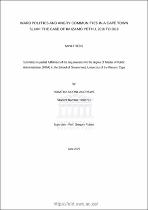| dc.contributor.advisor | Ruiters, Gregory | |
| dc.contributor.author | Ndoni-Andrews, Nomtha | |
| dc.date.accessioned | 2023-08-11T07:07:33Z | |
| dc.date.available | 2023-08-11T07:07:33Z | |
| dc.date.issued | 2023 | |
| dc.identifier.uri | http://hdl.handle.net/11394/10470 | |
| dc.description | Masters in Public Administration - MPA | en_US |
| dc.description.abstract | The democratic system of the South African Government motivates and engages the citizen to partake in governance at each level and especially at the ward level. Governance in a democratic country is complex because several unelected participants are involved, and power relations surpass the narrow confines of the local ward leaders and invited participation channels. Some wards are diverse; therefore, the question arises of how one person represents various communities. In this mini-thesis, councillors’ roles at the local government level are examined in an ‘angry community’ about competing interests and leaders’ backgrounds and priorities. Most often in South Africa, the most vulnerable populations are last in the queue. Ethical leadership in the neoliberal context often prioritises the advantaged, leaving underprivileged communities to resort to service delivery protests to have their voices heard. | en_US |
| dc.language.iso | en | en_US |
| dc.publisher | University of the Western Cape | en_US |
| dc.subject | Democracy | en_US |
| dc.subject | Leadership | en_US |
| dc.subject | Protests | en_US |
| dc.subject | Politics | en_US |
| dc.subject | Cape Town | en_US |
| dc.title | Ward politics and angry communities in a Cape Town slum: The case of Imizamo Yethu, 2016 to 2019 | en_US |
| dc.rights.holder | University of the Western Cape | en_US |

